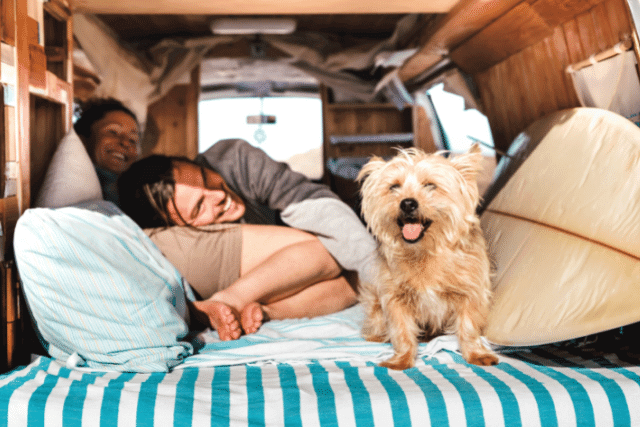Travelling with your pet

Are you planning the ultimate family staycation? Or maybe you are even considering travelling further afield to sample the cultural delights of our nearest continental neighbours?
Either way, if you are taking your furry friends along for the ride then follow our top tips to help make your travelling experience, and theirs, a little easier (and don’t worry if they are having a separate holiday to you, we have that covered as well)
Hitting the highway
If you are planning an extended trip by car with your furry family friend then preparation ahead of time is essential; from planning pet-friendly rest stops and accommodation to ensuring you have an sufficient supply of your pet’s food as well as any medicines it is currently on, just follow our handy checklist to ensure that the only memories you’ll be making this summer are picture perfect ones!
The safety stuff:
By law when driving in the UK you are required to ensure that all animals are appropriately restrained. Suitable restraints include a seat belt harness, pet carrier, dog cage or dog guard! To make this process more enjoyable and less stressful (for all involved) you should acclimatize your pet slowly to new restraint methods and allow plenty of time in advance for training. If you have a pet that is very nervous when travelling then speak to your vet for advice about calming products and more specific methods of training that will help your pet to travel with confidence.
Home comforts:
Visiting new places can be exciting but we all like a touch of our home comforts with us when travelling. The same goes for your pet so remember to pack their favourite toys and blankets/beds to provide a familiar and calming environment when the excitement of the trip gets a little too much!

Time for a pit stop:
When planning your route you need to ensure that any stops you have are at pet-friendly places. NEVER leave dogs or cats alone in cars on warm days: even if it’s cloudy, you have the windows open andpark in a shaded area; the temperature inside your car can reach dangerously high levels in just a few minutes!
Take frequent breaks, always carry a good supply of poo bags and ensure you have enough water on board to keep your furry friend fully hydrated – pets travelling in cars can become dehydrated very quickly; especially as they often don’t have constant access to water in a moving vehicle.
Tummy trouble:
Our pets can get travel sick just like us! You can help reduce the risk of tummy issues by ensuring you have enough of your pet’s regular food for the duration of your trip. Although you and the human members of your family will likely be savouring the local cuisine, enjoying family picnics or cooking up a storm at the barbecue, just remember that a sudden change in diet or feeding your pet unfamiliar foods and treats may result in diarrhoea and sickness.
Scavenging is another top cause of pet tummy trouble so make sure you keep a close eye on your pet whilst out roaming the countryside and beaches – what may seem disgusting to us can seem like a tasty treat to your pet!
If your pet is prone to tummy troubles whilst travelling you can speak to your vet about possible medications and supplements that may help: these can include anti-sickness medications and probiotics/prebiotics to help support your pet’s normal gut function.

Further Afield
Check the paperwork:
Since Brexit, you can no longer use a pet passport issued in Great Britain (England, Wales and Scotland) for travel to an EU country or Northern Ireland. Therefore if you wish to travel abroad from the UK with your pet, they will need valid travel documentation in the form of an animal health certificate or export certificate (depending on destination), as well as an up-to-date rabies vaccination and a working microchip. Your pet will need a new animal health certificate for each trip to an EU country or Northern Ireland, which must be issued by an Official Veterinarian (OV) no more than 10 days before you travel.
In addition, there are differing rules when travelling to an EU country or Northern Ireland, or a non-EU country, and specific requirements regarding extra vaccinations, blood tests and parasite treatments may be necessary before travel. Arranging all the correct treatments and paperwork for your pet to travel abroad can take a long time (sometimes even several months!).
For dogs, remember administration of tapeworm treatment by a vet is compulsory no less than 24 hours and no more than 120 hours (5 days) before you re-enter Great Britain. This means that for short trips away, it is possible for this to be done at your usual veterinary clinic. However, for longer trips you will need to arrange a vet visit whilst abroad to make sure both you and your furry friend can return home together. If you are travelling with your dog directly to Finland, Republic of Ireland, Northern Ireland, Norway or Malta you will need to get your dog treated for tapeworm. It will need to be treated one to five days before arriving in any of these countries and your vet must enter the full details on the Animal Health Certificate, following treatment.
If travelling by sea or air with your pet you will likely need extra documentation and even a specialist transport service to handle your pet’s care during transport. As with all of the important paperwork, remember to check specific requirements with your travel provider as well as ensuring you have all documentation, vaccinations and passports up to date for border control at your destination country
Due to the complex and changeable nature of pet travel requirements, if you are unsure what your pet may need to travel abroad then you can find the current requirements for both EU and non-EU countries on the government website (https://www.gov.uk/taking-your-pet-abroad), or you can speak to your vet for further advice.
The prospect of bringing your dog on holiday with you to mainland Europe or even further afield may seem like a great idea, however it’s important to research the area you are planning on visiting, well in advance, to find out whether there’s a risk that your pet could be exposed to diseases that we don’t have in the UK, such as leishmaniosis, or challenging weather conditions, such as extreme heat.
Whilst we hope that your holiday with your furry friend will run smoothly and be filled with fun,it’s important to be prepared for emergencies. Wherever you are travelling this summer, be sure to have contact details for a veterinary surgeon at or near your destination, just in case!
Leaving your pet behind this summer? Take a look at our quick guide to Kennels and Catteries
News

